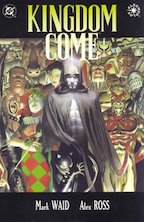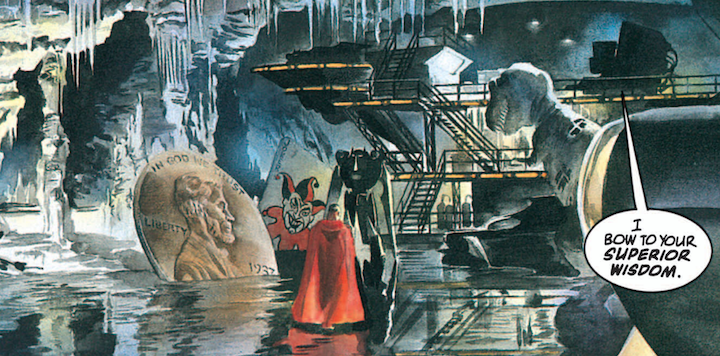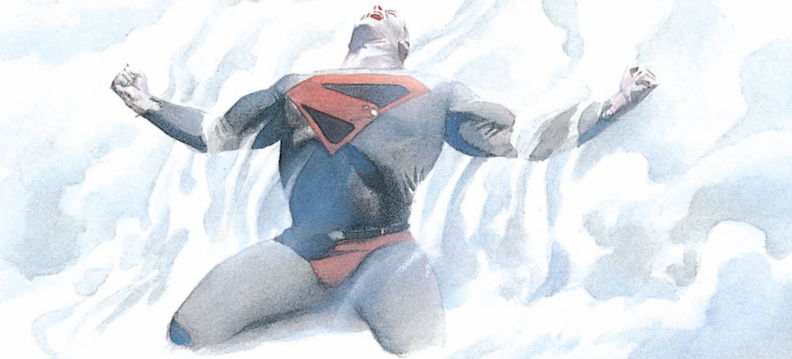Possibly the most celebrated DC Comics miniseries of the 1990s – and possibly all-time – was released 25 years ago today.

I had no idea what I was getting into when I bought the first issue of Kingdom Come back in 1996. I was only a couple of years into reading comic books regularly and I really only bought stuff featuring my favorite character, SUPERMAN. When Kingdom Come no. 1 came out, my comic shop guy handed it to me and suggested I get it. I was hesitant, because the first issue didn’t have Superman anywhere on the cover image, though the art was beautiful. “Trust me,” he said. “It’s worth it.”
That trust paid off. Kingdom Come turns out to be one of the best Superman stories of the last 30 years.
Kingdom Come was a four-issue prestige format miniseries released under the banner of DC Comics’ ELSEWORLDS imprint – stories that were outside of the publisher’s ongoing continuity, giving creators the freedom to tell stories without the restrictions of an ongoing, company-wide narrative. The first accepted Elseworlds title was 1989’s Gotham by Gaslight, but the name and the imprint wasn’t introduced until 1991. Many of the Elseworlds stories I’d read up to this point had put Superman or Batman into radically different situations: Superman at the end of time or as one of the Knights of the Round Table; Batman as a pirate. Many of these stories were good, but not great, and very few of them permeated through the zeitgeist of the comic book world.
Kingdom Come changed all that. With beautiful painted art from the always-impressive Alex Ross to the gripping story written by Ross and Mark Waid, Kingdom Come told a story that still feels relevant, even 25 years later.

Set in the near-future of the DC Comics universe, Kingdom Come opens on a world where the heroes of today retired after Superman retired when Metropolis began to favor a hero who was willing to kill. The Joker made his way into Metropolis, killing everyone at the Daily Planet – including Lois Lane. He was finally confronted by new superhuman Magog, who blasted a hole through the Joker’s chest. Superman had Magog arrested for murder, but a jury found him not guilty, pushing Superman to leave public life for good, along with all of his allies.
In the intervening years, the metahuman population grew wildly, and with the supervillains all but gone, the young and powerful began to battle themselves, without a moral compass and putting the lives of civilians in danger. When a mission led by Magog to capture a weakened Parasite results in the nuclear destruction of Kansas, Superman finally decides to re-emerge from the Fortress of Solitude and bring about a change to the new world order.
The story is told from the point of view of Pastor Norman McCay, a new character created for the story, who was given deadly premonitions of the future by the dying Wesley Dodda – the Golden Age Sandman. McCay uses his visions to guide the Spectre to view important events on the way to an impending apocalypse. McCay and Spectre take the reader through the story, detailing Superman’s struggles with becoming not just a leader to the superheroes who follow him but with his emergence as a leader on the world’s stage. Not everyone is on board with his plans. While it would be expected for someone like Lex Luthor to be working against him with his Mankind Liberation Front, the former Clark Kent is somewhat hurt by Batman’s refusal to cooperate with his goals, which include imprisoning metahumans who don’t join him in a gulag designed by Mister Miracle in the Kansas wasteland.

The schism between Superman and Batman is really the heart of the story, as the loss of Batman’s counsel after being away from humanity for a decade affects Superman’s judgment as he tries to stem the tide of metahuman violence in the world. As Superman points out late in the miniseries, the two heroes have different methods, but the goal of a better world was something they always shared. With Batman working his own agenda, mainly to infiltrate Luthor’s group to find out the status of CAPTAIN MARVEL, Superman’s main confidant and advisor is Wonder Woman, who is quicker to the blade than Superman cares to be. That reticence toward violence causes conflict among Superman’s coalition, adding to the powder keg that’s just waiting to blow.
The opening of the fourth and final issue of the miniseries is tense, as the different factions converge on the gulag and a war breaks out. The Spectre and Norman McCay watch on, removed from the action, as the world tumbles closer and closer to oblivion. Even the ordinary people of the world get involved, as the United Nations decides to take matters into their own hands and attempt to eliminate as many of the metahumans as possible.
The story is compelling and keeps you engaged throughout, but it’s enhanced so much from the art by Alex Ross. Not only is his photorealistic art beautiful, but he manages to throw in little Easter eggs that detail DC Comics’ history throughout the story. Even now, 25 years later, I can read the story and find something I hadn’t noticed before.
Despite being an Elseworlds story, Kingdom Come managed to permeate into the DC Universe proper in ways that no other “Imaginary Tale” had before. The publisher used the world of Kingdom Come for 1998’s The Kingdom, which saw a survivor of the Kansas disaster, dubbed Gog by the Quintessence, traveling back through time and killing Supermen. Without the involvement of Ross – and being a vehicle to introduce Grant Morrison’s concept of Hypertime into the world – The Kingdom didn’t have anywhere near the resonance of its predecessor.
That didn’t stop DC Comics from trying to invoke Kingdom Come within its regular continuity as much as possible, though. Alex Ross did eventually return to the characters with an extended arc in Justice Society of America, written by Geoff Johns. Thy Kingdom Come brought the Kingdom Come Superman and Starman to the main Earth as the JSA comes into conflict with a new version of Gog.
Once the DCU continuity rebooted in 2011 (and again in 2016 and again last month), the homages and links to Kingdom Come have begun to fade away, but the legacy of the series remains.
